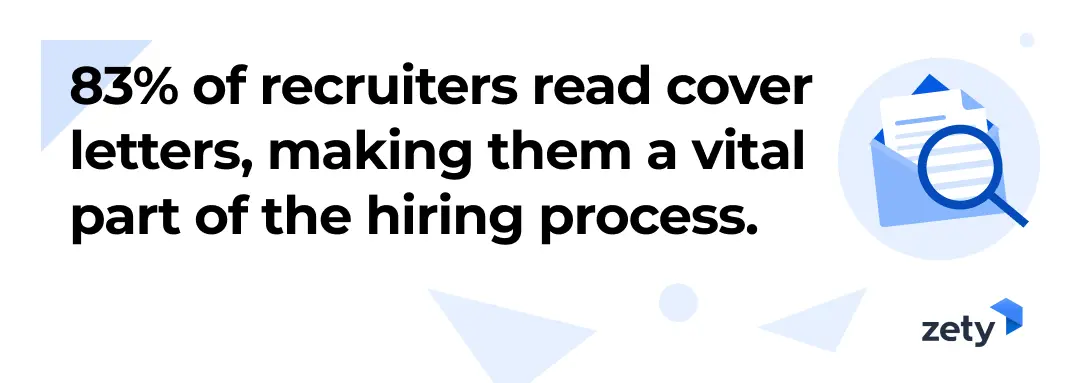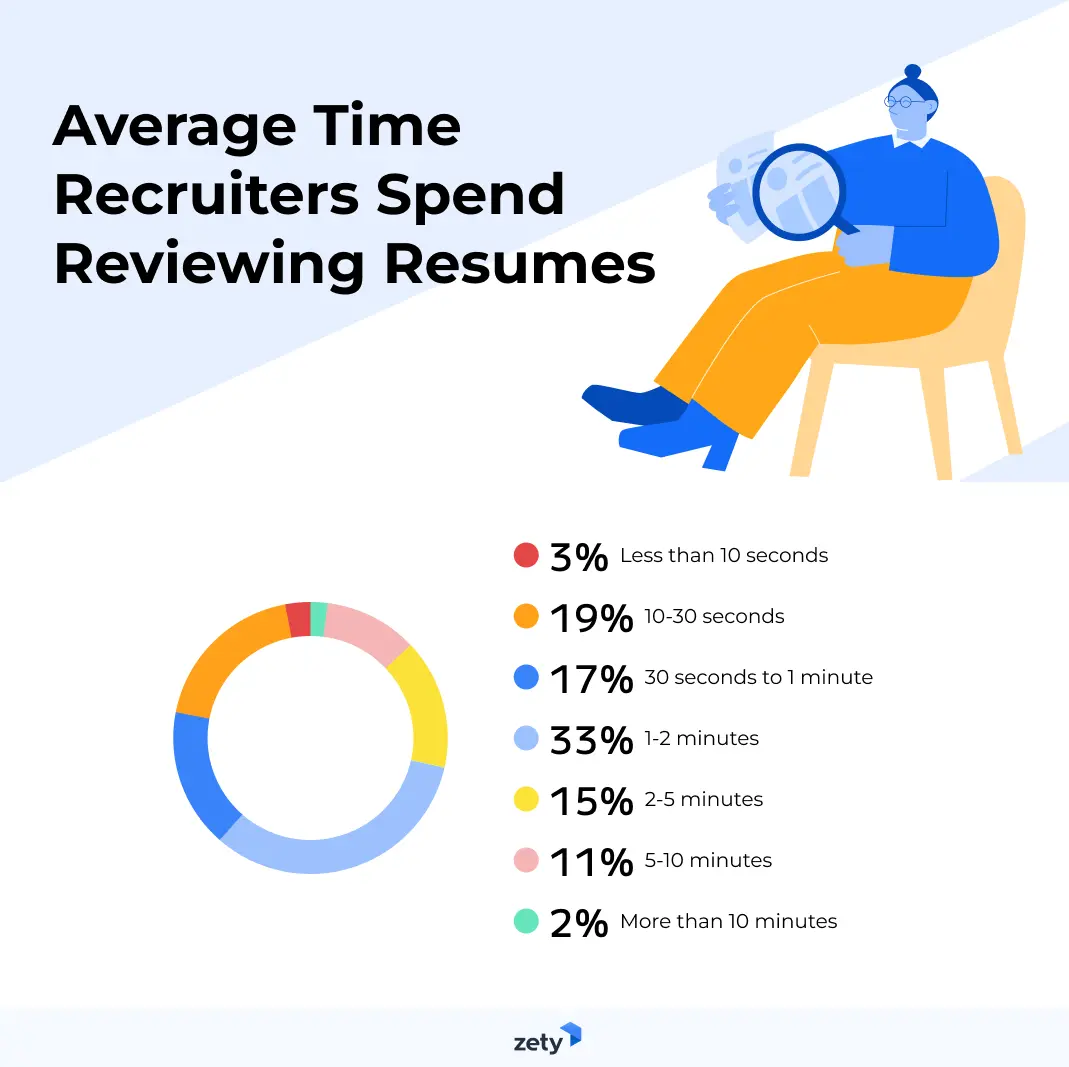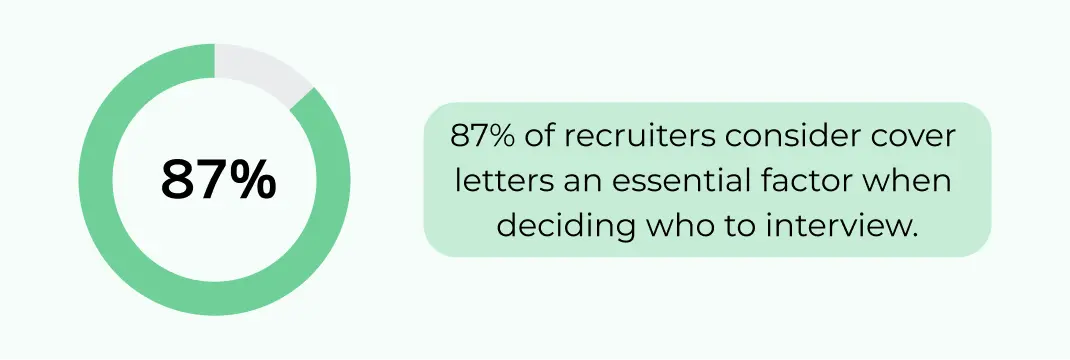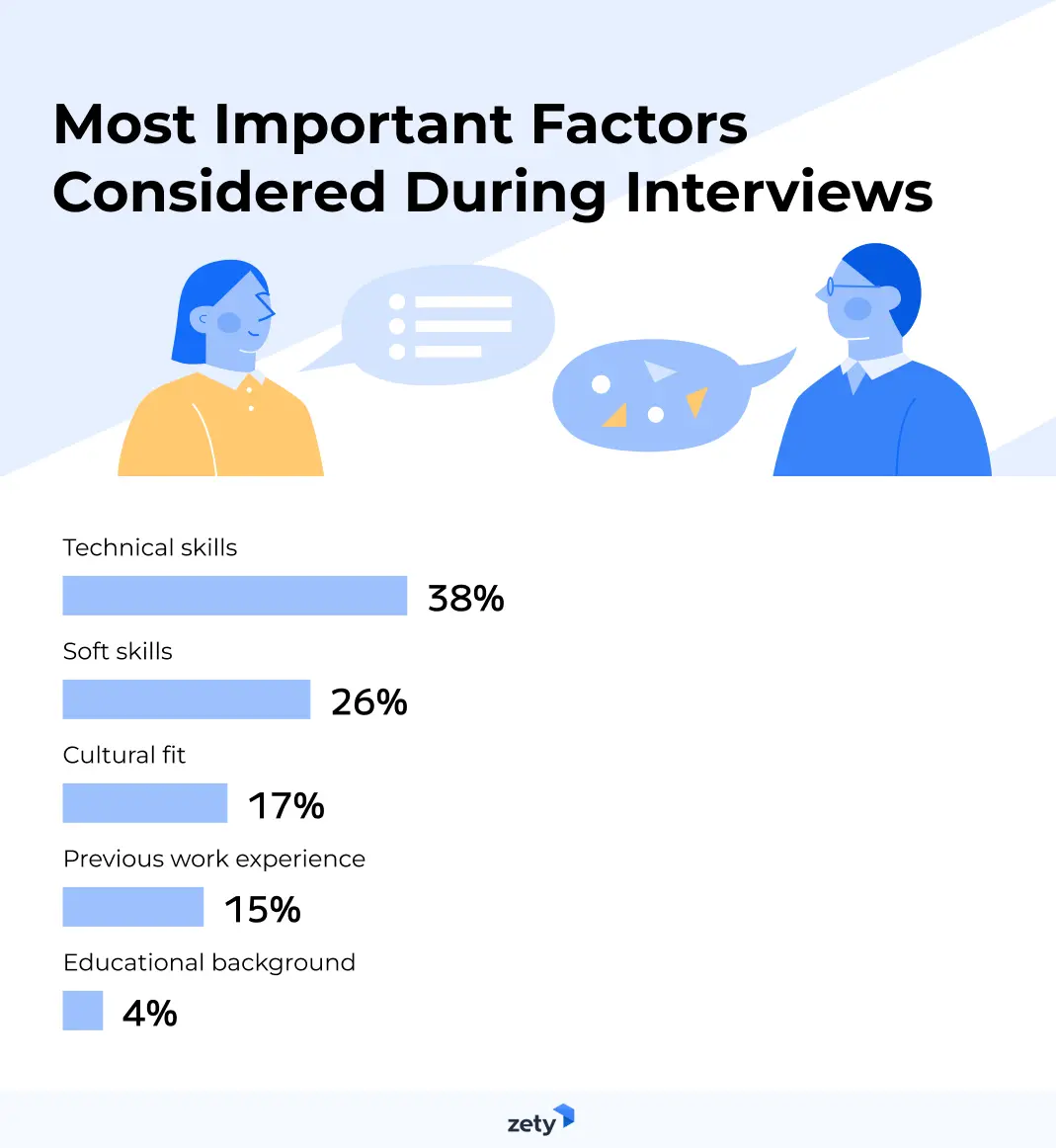 Understanding how recruiters think is a critical part of launching a successful job search. To find out more about how recruiters evaluate applicants, Zety polled 753 recruiters for itsRecruiting Preferences Report. The goal was to learn more about key factors that influence hiring decisions.
Understanding how recruiters think is a critical part of launching a successful job search. To find out more about how recruiters evaluate applicants, Zety polled 753 recruiters for itsRecruiting Preferences Report. The goal was to learn more about key factors that influence hiring decisions.
The report provides valuable insight into the mindset of recruiters, revealing that the majority focus on both technical and soft skills when assessing potential hires.
Key Findings:
- Most recruiters (72%) spend less than two minutes reviewing a resume before deciding whether to move forward with an applicant.
- 39% of recruiters focus on skills when first evaluating a resume – technical skills (38%) and soft skills (26%) are the two most important factors they consider during the interview process.
- 89% of recruiters expect candidates to submit cover letters and 87% consider them an essential factor when deciding who to interview.
First Impressions in the Job Search

In the current job market, initial perceptions can significantly influence recruitment decisions. As the survey findings highlight, recruiters typically spend only a short time assessing resumes before forming an opinion.
When asked how long they spend reviewing a resume, respondents stated:
- Less than 10 seconds (3%)
- 10-30 seconds (19%)
- Between 30 seconds and a minute (17%)
- 1-2 minutes (33%)
- 2-5 minutes (15%)
- 5-10 minutes (11%)
- More than 10 minutes (2%)
Considering the limited time hiring managers dedicate to resume reviews, common application pitfalls can lead to the rejection of qualified applicants. Notably, 76% of recruiters cite lies or exaggerations as a reason for dismissal, underscoring the importance of honesty in applications.The survey found that 46% of recruiters frequently verify the information provided in resumes or cover letters, while an additional 26% always do so.
Recruiters may also reject a qualified candidate for the following reasons:
- Poorly formatted (e.g., inconsistent fonts, alignment) application materials (72%)
- A resume that isn’t customized to the specific role (72%)
- A typo in their application materials (68%)
- An unprofessional email address on their application materials (61%)
What Recruiters Want in Resumes
A well-crafted resume extends beyond proper grammar and formatting. Zety’s report indicates that measurable results and data are essential components of a resume for most recruiters:
- 35% will not consider resumes that don’t highlight quantifiable results and data
- 54% usually do not consider resumes that omit measurable results and data
- 11% say measurable results and data do not influence their decision
When assessing an applicant’s resume, recruiters first look at:
- Skills (39%)
- Work experience (37%)
- Professional summary or resume objective (15%)
- Education/certifications (9%)
While 57% of recruiters prefer a two-page resume, 37% still favor a single page, and just 6% consider more than two pages ideal. This range of preferences highlights the necessity of personalized resumes, where candidates strategically choose their length and content to focus on the most relevant and impactful details.
Cover Letter Expectations

Despite ongoing debates over the value of cover letters, data shows they remain a critical element of the hiring process, shaping interview decisions and serving as a key consideration point for recruiters:
- Nearly 9 in 10 recruiters (89%) expect candidates to submit cover letters, with 83% stating they read them.
- 81% have rejected candidates based solely on their cover letters.
- 87% consider cover letters an essential factor when deciding who to interview.
Cover letters serve as a crucial tool for recruiters, providing insights into a candidate's potential suitability. When reviewing a cover letter, recruiters primarily focus on:
- An applicant’s ability to connect their work experience with the demands of the role (27%)
- Assessing an applicant’s personality and ability to communicate (24%)
- Determining whether the applicant is a referral or has some other connection to the company (19%)
- Learning whether the applicant has carefully read the job description (13%)
- Learning more about the applicant’s motivation for applying (9%)
- Examples of an applicant’s past professional achievements through the use of data and metrics (4%)
- Keywords that connect to the job ad (2%)
- The applicant’s unique selling points (2%)
In addition to these expectations, recruiters have varying opinions on the ideal cover letter length: 49% prefer half a page, 26% favor one page, and 25% prefer letters that are just a few sentences long.
Interview Preferences

Recruiters increasingly focus on a well-rounded evaluation of candidates that encompasses technical and soft skills. Assessments also play a crucial role during the interview process to confirm candidates' abilities and ensure cultural fit within the organization.
The most important factors recruiters consider during candidate interviews include:
- Technical skills (38%)
- Soft skills (26%)
- Cultural fit (17%)
- Previous work experience (15%)
- Educational background (4%)
63% of recruiters always (24%) or frequently (39%) use assessments during interviews, with the most common types being:
- Skill-based tests (e.g., coding tests, writing samples) (51%)
- Personality tests (50%)
- Cognitive ability tests (36%)
- Situational judgment tests (32%)
- Work simulations (23%)
Addressing Employment Gaps
Employment gaps remain a significant concern for recruiters, with 95% viewing these professional breaks as a red flag:
- 75% of recruiters agree that any gap in employment history is a red flag and impacts their decision to move forward with a qualified applicant – an additional 20% strongly agree with this statement. Only 4% disagree and just 1% strongly disagree that employment gaps are a red flag.
The survey revealed that most recruiters perceive these gaps negatively, requiring candidates to address them to remain competitive proactively. Recruiters' top preferences for candidates to address employment gaps are:
- In their cover letter (57%)
- During their interview (49%)
- In their resume (44%)
Key Insights:
Zety’s research shows that job seekers should focus on relevant skills, measurable achievements, and personalized cover letters to make their applications stand out. Understanding recruiters' priorities can help candidates connect with hiring managers and improve their chances of securing their desired roles.
For press inquiries, contact Skyler Acevedo at skyler.acevedo@bold.com.


